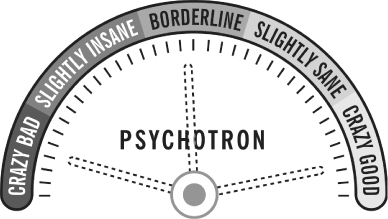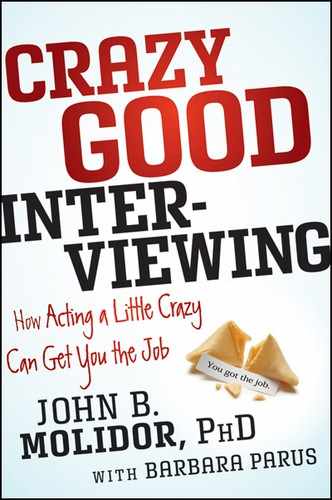Chapter 10
Head Games
Job candidates often fall victim to head games, the kind an interviewer plays on interviewees, and the kind that interviewees play on themselves. You could be the unwilling recipient of head games during any type of interview discussed in Chapter 9: phone, Skype, one-on-one, panel, and group interviews.
If you have the sneaking suspicion the interviewer is jerking your chain, you are probably right. Unfortunately, some interviewers will play mind games with job candidates to test their reactions. If you are unflappable, you will pass the acid test and may receive a job offer or, at least, be a finalist. If you crumble, then the interviewer will assume you probably cannot handle the stresses of the job. When you can't take the heat, stay out of the kitchen as the saying goes.
Although mind games cannot determine how you would handle stress in a real-life work situation, some interviewers persist in playing them. How can you tell if the interviewer is playing games? Chances are good if he starts challenging your response with pointed statements, such as “You gotta be kidding me.” “You really believe that?” “That wouldn't work here at all.”
Sometimes interviewers pretend they are mini-psychologists and try to crack open your brain and look inside. They will ask a barrage of questions that begin with “why” or “what.” For example: Why would you ever want to work here? What compelled you to accept some of your past jobs? What drives you to do the things you do? What is your underlying motivation?
You will feel like you are being psychoanalyzed, and you are almost tempted to ask, “Do you want me to lie down on the couch for this?”
Games Interviewers Play
You could encounter three types of head games in an interview: The Challenge, The Amateur Psychologist, and The Deadly Choice.
The Challenge: The interviewer responds to your answer with, “There is no way we would do that here.” Then, the interviewer will challenge you to see if you will change your mind about your statement, opinion, or belief.
In this game, the interviewer will challenge almost everything you say. The crazy good behavior is to hold your ground and not bend to satisfy the interviewer. In many cases, he or she is looking for someone who is assertive and stands up for himself. In other cases, the interviewer is just plain crazy, and there is nothing you can do about that. Two, however, can play that game. You can jam up the interviewer by saying, “Are all of the employees here like you? How do you characterize your behavior?” You won't get the job, but you will get some satisfaction in knowing that you refused to play the interviewer's stupid game.
The Amateur Psychologist: You will know you have encountered a budding Sigmund Freud if the interviewer says, “It sounds like you have an unresolved anger issue. Do you think you have a problem?”
The interviewer has put you on the defensive, which is not a good interview position. Your crazy good reaction is to turn the tables in this game and put a positive spin on your response. You can do this by saying things like: “What motivates me is to be able to use my talents to the best my ability and in the service of others. How would that philosophy apply to your organization?”
The main thing to remember with Sigmund-types is that sometimes a cigar is a cigar. Take what the interviewer offers and then answer the question in a way that reflects positively on you. Talk about what you want, what motivates or drives you, and the key abilities you have developed and will bring to the position.
The Deadly Choice: The interviewer will ask a question that has only two alternatives, and they are polar opposite. For example, “If you witnessed a staff member doing something that was against company policy, would you fire the employee on the spot or call security to escort the employee from the premises?”
If you do not agree with either option, the crazy good response is not to select one. The interviewer cannot play this game if you refuse to play. If possible, figure out what the interviewer is really asking, and then answer that question. For example, if the interviewer is hammering away at you and creating a stressful situation, you can respond with, “In similar situations where the stress level is raised, here is how I conduct my business.”
When mind games are being played, do not let interviewers rattle your cage. Describe how you handled stressful situations in the past. If necessary, take a deep, calming breath to reflect on your answer before you respond. When interviewers see that you are impervious to their head games, they will give up and proceed with the interview more normally.
On occasion, the interviewer is not playing head games, but displays some unusual behavior that is jolting. You are not quite sure how to react. The best reaction is no reaction, as illustrated in the following real-life interview.
Rate the Behavior

Using the Psychotron, how would you rate the job candidate's behavior in the following real-life interview?
Pick Me!
An owner of a direct mail marketing agency interviewed a young woman for a copywriter position. She was excited about the prospect of working at the up-and-coming agency, which aligned with her career plan, and she knew many candidates would be vying for the coveted spot. She prepared well for the interview, wore her best interview suit, and assembled a portfolio of her most impressive samples.
When she arrived for her 11 a.m. appointment, the owner informed her it would be a lunch interview. She was a bit surprised, but agreed to accompany him to a swanky restaurant where they were seated at a table with white linens, china, and crystal goblets. As they talked, he started playing with his nose. His finger wandered up his nostril and he began furiously digging for gold (or green)…all the while maintaining eye contact and holding a lively conversation. Then, he wiped his findings on the tablecloth next to his salad fork without batting an eye.
Amazingly, the woman kept her cool and ignored his bad manners although she couldn't believe what she was seeing. Later that day, she received the job offer. She didn't eat much of her spinach salad, though.
Tension Relievers
If you feel some tension building between you and the interviewer, how should you handle it? Tension can actually be a crazy good thing if you can show how you would resolve that tension. You demonstrate that by incorporating what the interviewer is saying and then weaving that into your response.
You can always say, “It is interesting that you say that. How did you come to think that way?” Then, you will link your answer to the interviewer's response.
Another crazy good technique is to acknowledge what is going on in the interview. You could say something like, “I feel like we got off track somewhere along the way. I would like to move us back to where I mentioned….”
Tension is not, in and of itself, a bad thing. Tension allows for opinions to be stated and discussed. Often it is not so much the position or philosophy of what you say; it is how you came to believe it. So talk about the process of how you came to believe something (e.g., your philosophy of work, how you treat others, how you use your abilities). Use tension to put energy into your interactions with the interviewer. This energy can move the interview process along and keep interest levels high.
How to Keep from Wigging Out
Some people are nervous by nature. They succumb to their own head games by getting worked up before the interview, worrying that they will forget their responses and make a poor impression. If you are a nervous wreck and are going to lose it, how do you regain your composure? Here are some helpful tips:
Your main job in the interview is to tell your story and explain your motivation for applying for this particular position. Share three key traits that you developed over time and what you can offer the organization. By focusing on this crazy good interview strategy, you will greatly increase your chances of a successful interview and forget all about being nervous.
